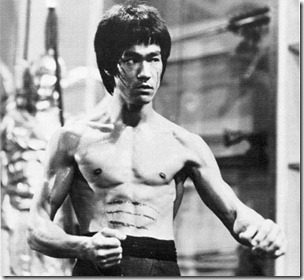Efficiency Is Anything That Scores
with one comment
 One of my favorite quotes from Bruce Lee: efficiency is anything that scores.
One of my favorite quotes from Bruce Lee: efficiency is anything that scores.
It’s simple, direct, and to the point – just like Bruce Lee’s approach to martial arts, Jeet Kune Do (JKD). Much has been written about Bruce Lee and JKD since his death in 1973, and just about as much has been misinterpreted, twisted, or otherwise confused. But one overwhelming and indisputable fact remains: Lee believed that the “classical mess” of traditional martial arts were a hindrance to personal growth. Specifically the focus on form over function, or system over person. The individualism of the individual was blanketed by the dogma surrounding them; in order to become self-actualized, a person is required to break free of the trap of limited thinking and find their own path.
This thinking transcends martial arts – it’s applicable to most aspects of life. But before going further, let me explain this in a little more detail. Let’s start with two men, both of them physically fit, intelligent, and interested in martial arts. These two men for the purposes of this exercise are equivalent; one isn’t more genetically gifted than the other. And drive, desire, and the necessary emotional intelligence are present in both of them. But both are training quite differently. Of course this example works just as well with male OR female protagonists, I just didn’t want to write a bunch of “he or she” or “him or her” 🙂
The first person is following a strict system or style and is focused on memorizing a thousand different techniques, both offensive as well as defensive. His training is rigid and “by the book”, and his motivation is primarily to perform these techniques during static forms, or step-by-step demonstrations of techniques without an opponent. As he progresses in the system, he’s doing it by memorizing more and more techniques and demonstrating how he can apply them against a demonstration partner. Any sparring or training done with another person is choreographed, or has unnatural limitations applied (i.e. no punching above the shoulders). His system resembles the prescription he’s received almost perfectly.
The second person is focused on understanding principles, not techniques. These principles include everything from body mechanics to acceleration and the application of force. The principles are translated into a small set of techniques, and he focuses on performing these techniques against a resisting opponent. i.e. someone who’s actually fighting back! As he trains this way, he learns which techniques work in practice and which don’t, and his own style starts to emerge over time. It isn’t as pretty as the other guy’s demonstration, but it works!
What’s the difference between the first person and the second? The first person is the product of an unbending system with very limited ability to think for himself. He didn’t learn any of the underlying principles behind the techniques he’s learned, and he’s never tested them. He has blindly followed what was given to him and has never attempted to pull-off any of these techniques against another human being fighting back. The second person has individualized his approach by starting with the basic principles and then refining his style by adding and subtracting things based on what works for him and what doesn’t. He realizes that efficiency is anything that scores. If it doesn’t work, it’s discarded. If it works, he will internalize it, tweak it, and make it his own.
The second person is a JKD man, the first is not. And the JKD man is closer to discovering the “truth” for himself, while the other is moving further and further from it.
Creating fancy forms and classical sets to replace sparring is like trying to wrap and tie a pound of water into a manageable shape of paper sack. For something that is static, fixed, dead, there can be a way or a definite path; but not for anything that is moving and living. In sparring there’s no exact path or method, but instead a perceptive, pliable, choice-less awareness. It lives from moment to moment. – Bruce Lee
Bottom line: Your approach to improving your own focus has to be both personal and tested for performance in the real world. There’s a very slim chance that you’ll be able to learn “the way” from anyone; your way can only be found on your own. And your way has to be comprised of tactics and techniques that work for you based on experience. If you really want to learn to focus well and to achieve balance in your life, it means dropping anything ornamental and getting to the root of why something works in practice (not in theory) for you… not for anyone else.
This means you need to think critically about everything you do; don’t just do it because someone said to. Everything you incorporate into your approach has to be there for a reason – and if it doesn’t work, it needs to be rejected just as quickly. The things that stand the test of time for you have to be there because they work in the “real world”.
Don’t be a product of a strict, unbending system. Learn the principles and try to apply them in objective reality until you find your path. Efficiency is anything that scores.



